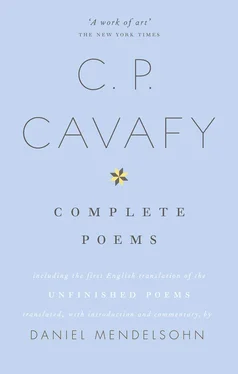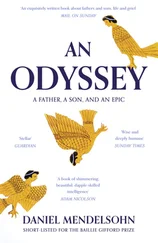the shops, the pavements, the stones,
and walls, and balconies, and windows;
there was nothing ugly that remained there.
And while I was standing, gazing at the door,
and standing, tarrying by the house,
the foundation of all my being yielded up
the sensual emotion that was stored inside.
[ 1917 ; 1919]
Can’t be more than twenty-two years old.
And yet I’m sure that, just about the same
number of years ago, I enjoyed that very body.
It’s not at all a flaring of desire.
And I only came to the casino a little while ago;
I haven’t even had time to drink a lot.
This very body: I enjoyed it.
And if I don’t remember where—one slip doesn’t signify.
Ah there, sitting at the next table now:
I recognize each movement—and beneath the clothes
I see once more the naked limbs I loved.
[ 1918 ; 1919?]
Body, remember not just how much you were loved,
not just the beds where you have lain,
but also those longings that so openly
glistened for you in the eyes,
and trembled in the voice—and some
chance obstacle arose and thwarted them.
Now that it’s all finally in the past
it almost seems as if you gave yourself to
those longings, too—remember how
they glistened, in the eyes that looked at you;
how they trembled in the voice, for you; remember, body.
[ 1916 ; 1917/1918]
I never found them, ever again—all so quickly lost …
the poetic eyes, the pallid
face. … in the gloaming of the street. …
I’ve not found them since—things I came to have completely by chance,
things that I let go so easily;
and afterwards, in anguish, wanted back.
The poetic eyes, the pale face,
those lips, I haven’t found them since.
[ 1909 ; 1917]
Poems 1919 – 1933
This room, how well I know it.
Now it’s being rented out, with the one next door,
for commercial offices. The entire house has now become
offices for middlemen, and businessmen, and Companies.
Ah, this room, how familiar it is.
Near the door, here, was the sofa,
and in front of it a Turkish rug;
Close by, the shelf with two yellow vases.
On the right—no, opposite, a dresser with a mirror.
In the middle, the table where he’d write;
and the three big wicker chairs.
Near the window was the bed
where we made love so many times.
They must be somewhere still, poor things.
Near the window was the bed:
the afternoon sun came halfway up.
… At four o’clock in the afternoon, we’d parted
for one week only … Alas,
that week became an eternity.
[ 1918 ; 1919]
One in the morning it must have been,
or half past one.
In a corner of that dive;
in back of the wooden partition.
Apart from the two of us, the place completely empty.
A kerosene lamp barely shed some light.
The vigilant servant was sleeping by the door.
No one would have seen us. But
we were so on fire for each other
that caution was beyond us anyway.
Our clothes were half undone—we weren’t wearing much,
since it was blazing hot, a heavenly July.
Delight in flesh amidst
clothes half undone:
quick baring of flesh—the image of it
has crossed twenty-six years; and now has come
to stay here in this poetry.
[ 1918 ; 1919]
Painter and poet, runner and thrower,
Endymion’s beauty: Ianthes, son of Antonius.
From a family close to the Synagogue.
“The days that I most value are the ones
when I abandon the aesthetic quest,
when I forsake the beauty and rigor of the Hellenic,
with its overriding preoccupation
with perfectly formed and perishable white limbs.
And I become what I would like
always to remain: of the Jews, of the holy Jews, the son.”
A bit too heated, this declaration of his. “Always
remain of the Jews, of the holy Jews—”
But he didn’t remain one at all.
the Hedonism and Art of Alexandria
made the boy into their devotee.
[ 1912 ; <1919?]
“… it should be loved all the more,
the pleasure that’s attained unwholesomely and in corruption;
only rarely finding the body that feels things as it wants to—
the pleasure that, unwholesomely and in corruption, produces
a sensual intensity, which good health does not know …”
A fragment of a missive
from the youth Imenus (of patrician stock), infamous
in Syracuse for dissipation,
in the dissipated times of Michael the Third.
[ 1915 ; 1919 ; 1919]
It certainly resembles him, this small
pencil likeness of him.
Quickly done, on the deck of the ship:
an enchanting afternoon.
The Ionian Sea all around us.
It resembles him. Still, I remember him as handsomer.
To the point of illness: that’s how sensitive he was,
and it illumined his expression.
Handsomer, he seems to me,
now that my soul recalls him, out of Time.
Out of Time. All these things, they’re very old—
the sketch, and the ship, and the afternoon.
[ 1919 ; 1919]
Of Demetrius Soter (162 – 150 B.C.)
His every expectation turned out wrong!
He used to imagine that he’d do celebrated deeds,
would end the shame that since the time of the Battle
of Magnesia had ground his homeland down.
That Syria again would be a mighty power,
with her armies, with her fleets,
with her great encampments, with her wealth.
He endured it, grew embittered in Rome
when he sensed, in the conversation of his friends,
the scions of the great houses,
in the midst of all the delicacy and politesse
that they showed toward him, toward the son
of King Seleucus Philopator—
when he sensed that nonetheless there was always a hidden
disdain for the dynasties of the Greek East:
which were in decline, not up to serious affairs,
quite unfit for the leadership of peoples.
He’d withdraw, alone, and grow indignant, and swear
that it wouldn’t be the way they thought, at all.
Look, he has the will:
would struggle, would do it, would rise up.
If only he could find a way to reach the East,
manage to get away from Italy—
and all of this power that he has
in his soul, all this vehemence,
he’d spread it to the people.
Ah, if only he could be in Syria!
He was so little when he left his homeland
that he only dimly remembers what it looks like.
But in his thoughts he’s always studied it
like something sacred you approach on bended knee,
like an apparition of a beautiful place, like a vision
of cities and of harbors that are Greek.—
And now?
Now, hopelessness and dejection.
They were right, those lads in Rome.
It’s not possible for them to survive, the dynasties
that the Macedonian Conquest had produced.
No matter: he himself had spared no effort;
as much as he was able, he’d struggled on.
Even in his black discouragement,
Читать дальше












